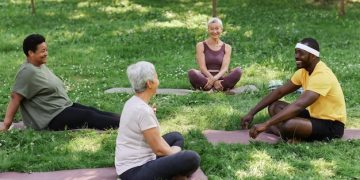Self-Care: Prioritize Your Well-being and Prevent Burnout

Self-care is crucial for maintaining mental, emotional, and physical health, effectively preventing burnout by fostering resilience, managing stress, and promoting overall well-being through actionable strategies and consistent practices.
In today’s fast-paced world, it’s easy to get caught up in the demands of work, family, and social life, often neglecting our own needs. Prioritizing self-care is not selfish but essential for sustaining our well-being and preventing burnout. Let’s explore why self-care is so important and practical tips to integrate it into our daily lives.
Understanding the Importance of Self-Care
Self-care involves recognizing and addressing your own needs and desires. It encompasses activities that replenish your physical, emotional, and mental resources, helping you to maintain a healthy balance in life.
Neglecting self-care can lead to chronic stress, exhaustion, and burnout. By making self-care a priority, you can improve your overall health, boost resilience, and enhance your quality of life.
The Benefits of Self-Care
Engaging in regular self-care practices isn’t just about pampering yourself; it’s about proactively taking care of your well-being. Here are some key benefits:
- Reduces Stress: Self-care activities like meditation, exercise, and hobbies help lower cortisol levels, reducing stress and anxiety.
- Improves Mental Health: Taking time for yourself can boost your mood, increase self-esteem, and promote a positive outlook.
- Enhances Physical Health: Proper nutrition, regular exercise, and adequate sleep contribute to a stronger immune system and overall physical well-being.
- Prevents Burnout: By replenishing your energy reserves, self-care helps you avoid the emotional, physical, and mental exhaustion associated with burnout.
Incorporating self-care into your routine is an investment that pays dividends in terms of your health, happiness, and productivity.
Identifying Your Self-Care Needs
Everyone’s self-care needs are unique. What works for one person may not work for another. The first step in prioritizing self-care is to understand what you need.
Take some time to reflect on your physical, emotional, and mental well-being. Identify areas where you feel depleted or stressed, and consider activities that might help you recharge.
Assessing Your Needs
Consider the following questions to identify your self-care needs:
- What activities make you feel relaxed, energized, or happy?
- What are your stress triggers, and how can you mitigate them?
- Are you getting enough sleep, nutrition, and physical activity?
Understanding your needs will help you create a self-care plan that is tailored to your specific circumstances.

Practical Tips for Physical Self-Care
Physical self-care involves taking care of your body through healthy habits and lifestyle choices. This includes proper nutrition, regular exercise, and adequate sleep.
These practices contribute to a stronger immune system, increased energy levels, and improved physical health.
Nutrition and Hydration
Eating a balanced diet and staying hydrated are fundamental to physical self-care. Here are some tips:
- Eat Whole Foods: Focus on fruits, vegetables, lean proteins, and whole grains.
- Limit Processed Foods: Reduce your intake of sugary drinks, fast food, and processed snacks.
- Stay Hydrated: Drink plenty of water throughout the day to support bodily functions and energy levels.
Making mindful food choices can have a significant impact on your overall health and well-being.
Exercise and Movement
Regular physical activity is essential for both physical and mental health. Choose activities you enjoy and make them a part of your routine.
Even short bursts of exercise, such as a 15-minute walk or a quick yoga session, can make a difference.
Effective Strategies for Emotional Self-Care
Emotional self-care involves recognizing and managing your feelings in a healthy way. This includes setting boundaries, practicing self-compassion, and engaging in activities that bring you joy.
Prioritizing emotional self-care can help you build resilience, reduce stress, and improve your relationships.
Setting Boundaries
Establishing clear boundaries is crucial for protecting your emotional energy and well-being. Here’s how:
Setting boundaries helps you maintain healthy relationships and protect your emotional well-being by ensuring your needs are respected.
Practicing Self-Compassion
Treating yourself with kindness and understanding is a powerful form of emotional self-care. Here’s how to cultivate self-compassion:
- Acknowledge Your Struggles: Recognize that everyone faces challenges and setbacks.
- Practice Positive Self-Talk: Replace negative thoughts with supportive and encouraging messages.
- Be Kind to Yourself: Treat yourself with the same compassion you would offer a friend.
Self-compassion can help you navigate difficult emotions and build a stronger sense of self-worth.

Techniques for Mental and Cognitive Self-Care
Mental self-care involves engaging your mind in ways that stimulate creativity, promote relaxation, and reduce mental fatigue. This includes practicing mindfulness, engaging in hobbies, and learning new skills.
Prioritizing mental self-care can sharpen your focus, enhance your memory, and improve your overall cognitive function.
Mindfulness and Meditation
Practicing mindfulness and meditation can help you quiet your mind, reduce stress, and improve your overall mental well-being. Here’s how to get started:
Mindfulness and meditation can provide a sense of calm and clarity in the midst of a busy day.
Engaging in Hobbies
Pursuing hobbies and interests can provide a creative outlet, reduce stress, and enhance your overall sense of well-being. Choose activities that you find enjoyable and fulfilling.
Whether it’s painting, gardening, writing, or playing music, engaging in hobbies can provide a much-needed mental break and boost your creativity.
Integrating Self-Care into Your Daily Routine
Integrating self-care into your daily routine doesn’t have to be time-consuming or expensive. Small, consistent actions can make a big difference in your overall well-being.
Start by incorporating a few self-care practices into your day and gradually expand your routine as needed.
Creating a Self-Care Plan
To make self-care a consistent part of your life, create a simple plan that outlines your priorities and goals. Consider the following steps:
A well-structured self-care plan can help you stay on track and ensure that you’re consistently prioritizing your well-being.
Overcoming Barriers to Self-Care
Despite the many benefits of self-care, many people struggle to make it a priority. Common barriers include lack of time, feelings of guilt, and societal pressures.
By recognizing these barriers and developing strategies to overcome them, you can make self-care a more consistent and integral part of your life.
Addressing Time Constraints
Many people believe they don’t have time for self-care. However, even small pockets of time can be used effectively. Here are some tips:
- Schedule It: Treat self-care like any other important appointment and add it to your calendar.
- Multitask Mindfully: Combine self-care with necessary tasks to make the most of your time. For example, listen to a podcast while doing chores.
Remember, self-care doesn’t have to be time-consuming to be effective.
| Key Point | Brief Description |
|---|---|
| 🧘 Mindfulness | Practice daily to reduce stress and enhance mental clarity. |
| 🏃 Exercise | Engage in regular physical activity for better physical and mental health. |
| 😴 Adequate Sleep | Prioritize getting enough sleep each night for recovery and energy. |
| 🤝 Social Connection | Maintain meaningful relationships for emotional support. |
Frequently Asked Questions About Self-Care
Self-care encompasses any deliberate actions taken to foster one’s physical, mental, and emotional well-being. It ranges from ensuring adequate sleep and nutrition to engaging in hobbies and mindfulness practices.
Self-care is important because it helps manage stress, prevents burnout, and boosts overall happiness and health. It allows individuals to recharge and maintain a healthy life balance.
Integrate self-care by scheduling short, regular activities into your day. Combine self-care with other tasks or use small pockets of time for mindfulness, stretching, or listening to music.
Avoid generic or guilt-ridden self-care. Make sure activities resonate with your needs and avoid feeling guilty for taking time for yourself. It is an investment, not an indulgence.
Self-care enhances productivity by reducing stress and improving focus. Properly managing stress and overall well-being leads to increased alertness, creativity, and job satisfaction, ultimately boosting performance.
Conclusion
Prioritizing self-care is an investment in your overall health and well-being. By understanding the importance of self-care, identifying your needs, and integrating practical tips into your daily routine, you can effectively prevent burnout and enhance your quality of life. Remember, taking care of yourself is not selfish; it’s essential for sustaining a happy, healthy, and fulfilling life.





